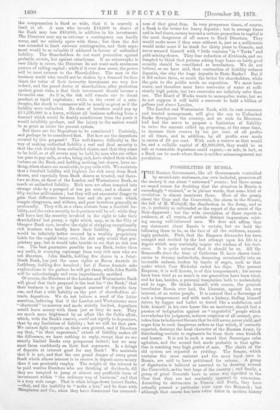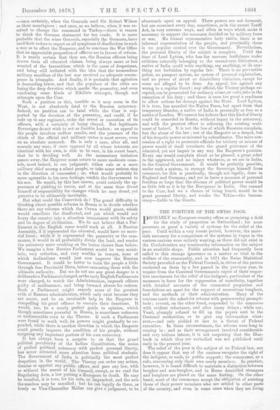POSSIBILITIES IN RUSSIA.
THE Russian Government, like all Governments controlled by second-rate statesmen, our own included, preserves all the secrecy it can about " untoward" events ; but there seems no sound reason for doubting that the situation in Russia is exceedingly "strained," or in plainer words, that some kind of revolution is almost imminent there. Most of the gossip about the Czar and the Ozarevitch, the alarm in the Senate, the fall of M. Walujeff, the disaffection in the Army, and so on, is probably as unfounded as the report of the arrest of the Heir-Apparent ; but the wide circulation of these reports is evidence, at all events, of certain distinct impressions exist- ing among well-informed men. We dare not affirm that any statement about Russia is certain, but we hold the following three to be, on the face of all the evidence, exceed- ingly probable. First, that the Emperor Alexander has been enraged and excited by the last attempt upon his life to a degree which may materially impair the wisdom of his deci- sions. It is quite natural that it should be so. All the Romanoffs since the time of Catherine II. have shown tend- encies to dreamy melancholy, deepening occasionally into an incurable sadness, broken by bursts of anger, such as that under which Czar Nicholas ended his days. The present Emperor, it is well known, is of this temperament ; his nerves have been tried as no man's in our generation have been tried, and he has, besides, a personal temptation both to melancholy and to rage. He thinks himself, with reason. the greatest benefactor Russia ever had, the liberator, against his own interest, of an entire people. It is natural that a Sovereign of such a temperament and with such a history, finding himself driven by dagger and bullet to travel like a malefactor, and hide himself in his own house like an insolvent, should feel a passion of indignation against an " ungrateful " people which overwhelms his judgment, induces suspicion of all around, pro- vokes him to indiscreet threats that he will never, never yield, and urges him to such dangerous orders as that which, if correctly reported, destroys the local character of the Russian Army, by distributing recruits to regiments far from their own kinsfolk and homes. It is not in such a mood that Sovereigns calm agitation, and the second fact made probable is that agita- tion is reaching very high grades of men. The chiefs of the old system are reported as yielding. The Senate, which contains the most eminent and the most loyal men in Russia, are said to have petitioned for reform. A group of dignitaries is believed or asserted to be drawing around the Ozarevitch, as the best hope of the country ; and finally, a group of great Generals have in some way signified to the Czar that they are not resolutely opposed to concession. According to statements in Vienna and Pesth, they have actually pressed a particular view upon the Monarch ; but although that course has been twice taken in modern history
—once certainly, when the Generals used Sir Robert Wilson as their mouthpiece ; and once, as we believe, when it was re- solved to change the command in Turkey—there is reason to think the German statement far too crude. It is more probable that the wiser Generals, especially the Germans, have used their orders to report on all symptoms of disaffection in such a way as to affect the Emperor, and to convince the War Office that an appreciable proportion of officers are in favour of reform. It is nearly certain that they are, the Russian officers being drawn from all educated classes, being always more or less wearied of the favouritism which is the curse of despotisms, and being still irritated with the idea that the tremendous military sacrifices of the last war received no adequate recom- pense in triumphs. And finally, it is probable that agitation is descending lower, and that the populace of the cities are losing the deep devotion which marks the peasantry, and even condoning some kinds of Nihilists attempts, though not attempts upon the Czar.
Such a position as this, terrible as it may seem in the West, is not absolutely fatal to the Russian autocracy. Indeed, no position can be fatal while the Czar is sup- ported by the devotion of the peasantry, and could, if he rode up to any regiment, order the arrest or execution of its officers, with a certainty of being obeyed. But legitimate Sovereigns do not wish to act as Jacobin leaders ; an appeal to the people, involves endless results, and the pressure of the chiefs of the official and military castes is most severe, even on an absolute monarch. He is only a man, after all, and scarcely any man, if once opposed by all whose interests are identical with his own, is able to be sure, in his secret heart, that he is deciding well. As the momentary irritation passes away, the Emperor must return to more moderate coun- sels, must indeed, in our judgment, either rule as a mere military chief among a silent people, or take some serious step in the direction of concession ; or, what would probably be more agreeable to his own feelings, confide the Government to his son. He would, by this last course, avoid entirely the ap- pearance of yielding to terror, and at the same time divest himself of responsibility for changes which he may dread, yet perceive to be ultimately inevitable. But what could the Czarevitch do I The grand difficulty in thinking about possible reforms in Russia is to decide whether there are any reforms which the Crown would grant, which would conciliate the disaffected, and yet which would not hurry the country into a situation inconsistent with its safety and its degree of civilisation. We do not believe that a Par- liament in the English sense would work at all. A Russian Assembly, if it represented the educated, would have no mate- rial force ; while if it represented the peasantry or the com- munes, it would in all probability divide the land, and render the autocracy more crushing on the better classes than before. We imagine a free Russian Parliament would be very social- istic, very orthodox, and very warlike in temper, none of which inclinations would just now improve the Russian Government. It would be better to train the people a little through free Provincial Diets, before entrusting them with the ultimate authority. But we do not see any great danger in a deliberative Parliament charged, as the early English Parliaments were charged, to watch the Administration, impeach officers guilty of malfeasance, and bring forward abuses for redress. Such a Parliament might remedy some of the greatest evils of Russian administration, which only exist because they are secret, and be an invaluable help to the Emperor in compelling his great officers to execute their functions. It would, too, be a nearly perfect guide to opinion, which though sometimes powerful in Russia, is sometimes unknown or undiscernible even to the Throne. If such a Parliament were found to work well, its powers might gradually be ex- panded, while there is another direction in which the Emperor could greatly improve the condition of his people, without resigning any important portion of his own autocracy.
It has always been a surprise to us that the grand political peculiarity of the Indian Constitution, the union of perfect political autocracy with perfect personal liberty, has never attracted more attention from political students. The Government of India is politically the most perfect despotism in the world. The Viceroy can order any action, dismiss or appoint any public officer, and pass any law, with or without the assent of his Council, except, as we read the Regulating Acts, a law putting a European to death. He may be recalled, it is true, for his acts, or impeached, and the acts themselves may be annulled ; but he can legally do them, as freely as Vice-Chancellor Maims can give a judgment, to be
afterwards upset on appeal. These powers are not dormant, but are exercised every day, sometimes, as in the recent Tariff Act, in very extreme ways, and often in ways which make it necessary to support the measures decided on by military force or war. No formal representative body exists, there is no informal representation of the people, and practically there is no popular control over the Government. Nevertheless, the personal liberty of the subject is complete. Until the time of Lord Lytton, who has the nervous fretfulness under criticism naturally belonging to the second-rate litterateur, a native of India could write anything, say anything, or do any- thing not forbidden by regular law. There is no preventive police, no passport system, no system of personal registration, and no power of arrest or domiciliary visitation, except for some act alleged to be done. An appeal lies against any wrong to a regular Court ; any official, the Viceroy perhaps ex- cepted, can be prosecuted for ordinary crime, or 721106 fides in the execution of his duty ; and there is even too great a readiness to allow actions for damage against the State. Lord Lytton, it is true, has muzzled the Native Press, but apart from that temporary blunder, a native of India is personally as free as a native of London. We cannot but believe that this kind of liberty could be conceded in Russia, without injury to the autocracy, and with the greatest effect in relieving the existing senti- ment of hatred. It is not the law of which Russians complain, but the abuse of the law ; not of the Empefor as a despot, but of his despotic power as misused by subordinates. The mere con- cession of a right to prosecute officials for trickery or misuse of power would of itself terminate the grand grievance of the educated, yet not impair in any way the Emperor's position. Every one would complain aloud as he pleased, a great relief to the aggrieved, and no injury whatever, as we see in India, to the Central Government. It would be perfectly possible, under such a system, to exempt the Sovereign himself from comment, for this is practically, though not legally, done in England and Germany, and yet to leave a measure of personal freedom so large that the absence of political power would be as little felt as it is by the Europeans in India. Our counsel to the Czar, had we a chance of being heard, would be to grant personal liberty, and render the Tchin—the bureau- cracy—liable to the Courts.







































 Previous page
Previous page